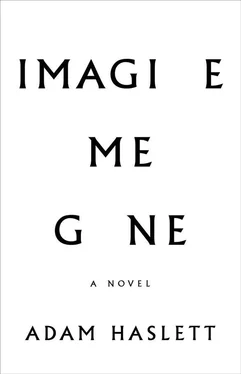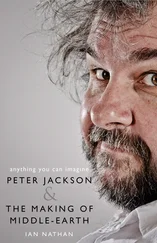He turned off into a Speedway, and I parked at the edge of the lot to wait for him. He struggled with the gas cap, unable to open it. A minute went by, and then another, and still he couldn’t manage the task. He didn’t kick the truck in frustration. He showed no signs of impatience at all. He just stood there, failing at it. Until eventually he turned around and scanned the lot. When he saw me, he didn’t wave me over or call my name. He remained by the capped tank, helpless and abdicating. Can’t you do it for me? his expression asked.
“I’m curious,” I said later, in a Thai restaurant in a strip mall near campus. “What would you have done if I hadn’t been there?”
“I guess I would have figured it out,” he said sheepishly.
“And if you’d been with Caleigh, you would have figured it out, right? You wouldn’t have just stopped. What is that? Why do you do that with me?” He’d passed beyond his hyperarticulate, racing worry into a kind of fugue state, scared of the menu and the waiter and the food. “Why should it be different?” I said, jabbing the question at him, willing him to do better than this.
“I don’t know,” he said. “I’m sorry.”
My phone rang — Seth calling from Denver. I told Michael I would be back, thankful for the excuse to get up and walk out, even if it was into the hot evening air.
“It’s like babysitting,” I said after Seth asked me how things were going. “Like taking care of an aging child.”
“He must be glad you’re there, though,” Seth said.
“I guess. That’s not how it comes out, but yeah.”
I asked about his visit home. He’d spent the morning playing video games, and the afternoon at the mall. When we’d first started dating, each new discovery — that I didn’t need to make weekend plans to fill empty evenings, that I had someone to talk to at the end of the day — had come as a revelation. The discoveries were different now. I could sense his mood in a phrase or two. I knew when he was worried about me, and felt guilty for it. These were their own kind of marvels, strangely reassuring as proof that Seth and I were, in fact, involved. Just hearing him describe his day with his family untensed me. Forty-eight hours with Michael and it was as if my own life had ceased. I hadn’t returned phone calls or even responded to my editor’s e-mails. Through the plate-glass window of the restaurant, I saw my brother waiting in front of the food that had now arrived. For a moment, I glimpsed him as a stranger might: a thin, unshaven man in black cotton work pants and a gray button-down shirt damp at the armpits. Pale-skinned, hair thinning, already middle-aged.
Seth was going on about a party he wanted us to go to the following weekend, and a friend he wanted me to meet, and I said it all sounded fine, without really listening, thinking instead of the picture of Bethany I’d seen on the desktop of Michael’s computer when he opened it at the apartment, still there after all these years.
“You had a long day,” Seth said. “I’ll let you go.”
“Can we talk before bed?”
“Yes, silly. Of course.”
As soon as I reached the table, Michael asked what was wrong.
“Nothing,” I said. “Why should anything be wrong?”
“I just thought something might be the matter.”
“No,” I said, scraping rice onto my plate, suddenly ravenous. “It was Seth. The guy I’m seeing. I’ve mentioned him to you.”
“Is he okay?”
“He’s fine,” I said. “Everything’s fine.”
“You’re dating him.”
“Yes.”
“That’s good,” Michael said. “How is it going?”
“Actually,” I said, “it’s going really well.” I could have stopped there. But he’d asked. “To be honest, I think we might be in love.”
His head moved fractionally up and back, as if avoiding a punch. “That’s good,” he repeated, more gravely this time. “I’m amazed you haven’t been talking about it. I can’t imagine not needing to talk about it. Given how frightening it is. You must be afraid he’s going to leave you.”
“Not really. I think we’re good.”
He squinted at me, trying to make sense of what I was saying. “Where did you meet?”
“Online. Last winter. He’s from Colorado. His parents are still there, still married. Apparently they want to meet me, which I guess is a good sign.”
“Extraordinary,” Michael said. “Has he been in therapy?”
“I don’t think so.”
“What do you guys talk about?”
“Whatever comes up, I guess. He’s got good taste in music. You’d like some of the stuff he’s played me.”
More than telling him I was in love, it was telling him this that felt cruel. Michael’s crushes had always run through music. This would make it real for him.
“He understands my work, too,” I said. “When things come up last minute, or I have to leave town, he’s good about that. You should meet him sometime.”
“Sure,” Michael said, gazing at the curries, which he still hadn’t touched. He didn’t lack an appetite. He just seemed to have forgotten how to serve himself.
“Here,” I said, holding out a plate to him. “Eat.”
And so we did, in silence.
“What courses are you going to take?” I asked, eventually.
This he was able to answer at length, listing subjects and texts, going into the critical orientations of the various members of the faculty and how they did or didn’t comport with his own theoretical commitments. “I’ve read most of the first two years of the material before,” he said. “I’d start my dissertation tomorrow, if they’d let me.”
Seeing an opening, he started in on his perennial subject: slavery and trauma. I could never tell if he actually thought he was discoursing on all this to me for the first time, in which case the drugs had given him mild dementia, or if — and this seemed more likely — it didn’t matter a great deal whom he was describing it to, he just needed to narrate it, over and over.
Earlier that summer the magazine had run my first feature in months. I had written a story about Wall Street bundlers who had begun to favor Democrats. My editor had cut some of the color I’d worked hard to get into the piece but not, for once, the implied criticism. It had drawn a slew of comments on the website and been reposted all over, making the marketing department giddy with excitement. Michael was on the list of friends and family to whom I had sent a link, people who didn’t read the magazine and would otherwise never see my work. He’d been on that list for years. My mother subscribed, of course, wanting to see my articles in print. Celia usually sent a quick e-mail in response, as she had to this one. But from Michael, as usual, not a word. At home during Thanksgiving or Christmas, he would listen attentively enough if I was telling him about an assignment, but I had no sense if he ever read what I wrote, and, if he did, what he thought of it.
As the waiter arrived to clear our plates, I asked Michael about it. Maybe it was having finally told him about Seth. Or the fact that I had a flight back to New York in the morning, and didn’t know when I would see him next. Or simply that the two of us hadn’t spent this kind of time together in I couldn’t remember how long, and I wanted to know.
He appeared confused by my question, and took his time answering.
“You’ve had advantages,” he said. “The networks you’ve been a part of, the friends who’ve hired you.” How did he know friends had hired me? Had I told him that? Had Celia? “The kinds of advantages most black people don’t get,” he added.
I’d been leaning forward in my chair, keen for his response, but I sat back in wonder now. I didn’t think he had given my reporting a second thought. But no, he had it all worked out.
Читать дальше












